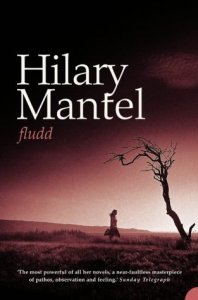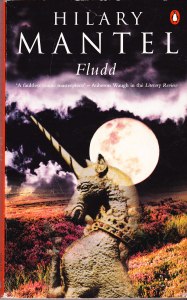Hilary Mantel is best known in recent years for her award winning novels Wolf Hall (2009) and Bring Up the Bodies (2012). Given the accolades showered upon Mantel’s fictional treatment of Tudor England, readers may be forgiven for overlooking one of her earlier novels, Fludd (1989.) Indeed, short, strange, tragicomic, and allegorical, Fludd could easily be dismissed as a curio, a relic predating Mantel’s ascent to literary stardom. But like the novel’s title character, Fludd conceals more than it lets on.
Mantel takes us to Fetherhoughton, a dour mill town in the north of England. Mid-twentieth century Fetherhoughton is a singularly miserable place, surrounded by moors on three sides, “the vast cemetery of [the villagers’] imaginations” (12). Father Angwin, Fetherhoughton’s spiritual leader, is a drunk. He is also an atheist. Agnes Dempsey, Father Angwin’s be-moled housekeeper, cares for the priest and keeps him to a semblance of order.
The “modern” bishop, upon visiting Fetherhoughton, insists that Father Angwin dispose of the statues of saints that line the church. Father Angwin is distraught: “[F]aith being dead, if we are not to become automatons, we must hold on to our superstitions as hard as we may” (27). The bishop will also send a curate to “assist”–that is, spy upon–Father Angwin. When the titular Fludd arrives in Fetherhoughton, he is both more and less than what he seems, and he sets into motion events that will change the lives of Father Angwin, Agnes, and Sister Philomena, among other Fetherhoughtonians.
Mantel narrates Fludd with a diction that is distinctly English even to these benighted American ears. The “typography of Fetherhoughton may repay consideration,” Mantel tells us. “So may the manners, customs and dress of its inhabitants,” all of which, by the way, Mantel neatly skewers (11). That line is representative of a syntax and vocabulary that is singularly English. The propriety of Mantel’s writing lends it an archness that simultaneously softens and enhances the jibes she makes at her characters’ expense. Fetherhoughtonians, stand-ins for Mantel’s northern countrymen, refer to the second stories of their homes as “miyoopstairs” (13). Distraught by the suggestion of the vernacular Mass, Father Angwin comments of the townspeople, “I can well understand if you think Latin’s too good for them. But the problem I have here is their little grasp of the English language, do you see?” (10). Mantel employs this diction and tone to great comic effect throughout Fludd. She makes it plain that Fetherhoughtonians know nothing about their faith, and the (faux) politeness of her delivery demonstrates not only the absurdity of their practice, but also the absolute confidence with which they mangle their religion.
Some readers have complained that Fludd loses its momentum in its third act. It’s true that the story grows somber as Mantel shifts her perspective from Father Angwin’s battles with the bishop to Sister Philomena’s more existential struggle with life as a nun. In my opinion, Mantel’s decision to focus on Sister Philomena improves the story. It takes what would be a passing comedy and lends it greater depth. As Mantel makes clear before she begins the novel, Fludd is based on a sixteenth and seventeenth century alchemist, so the story must involve transformation. Some readers may find Sister Philomena dull–I did not–but, by becoming involved with her, Fludd himself is changed. Fludd confesses that he normally ignores women, but he is drawn to Philomena. Through Philomena, then, Mantel takes a deus ex machina-type character, the mysterious and unknowable Fludd, and illuminates his humanity. The novel is the better for it.
Fludd may not be a perfect or even a great novel, but it is a very good one. Some readers have commented on its subtle “gothic” tone, but that’s hardly right; indeed, if the gothic is present at all in Fludd, it is there for Mantel to mock. Fludd is something of a paradox. It is a comedy that knows the importance of the issues at which it pokes fun. Mantel is cynical, but she also believes in personal transformation. It is complicated, like Father Angwin, who, having given up on God, fights all the harder on behalf of “the dear old faith.” Fludd is of two minds, like many of us these days: “Everyone is where they should be; or we may collude in pretending so. And God’s in his heaven? Very bloody likely, Father Angwin thought” (157). Highly recommended.


I much prefer the “unicorn” edition:-D I have yet to read anything by Mantel, not sure I’d start with this one, however!
I’ve read this and Wolf Hall. I recommend starting with the latter (although the prose took some getting used to).
Very Interesting – I had planned to check out Wolf Hall soon (this year, maybe next), I shall have to see if Fludd is at the local library.
Cheers
KT